M. Pickavance talks about Microsoft and
its Machiavellian intentions towards its most successful operating system.
I’m old enough to have
experienced a few ‘death watches’, where the terminally unwell are guided
through their final hours. Hoverer, I don’t ever recall this expression being
used in respect of a computer operating system, until now.
Windows XP, I come not
to praise you, but to watch with incredulity as Microsoft tries to bury you
alive.
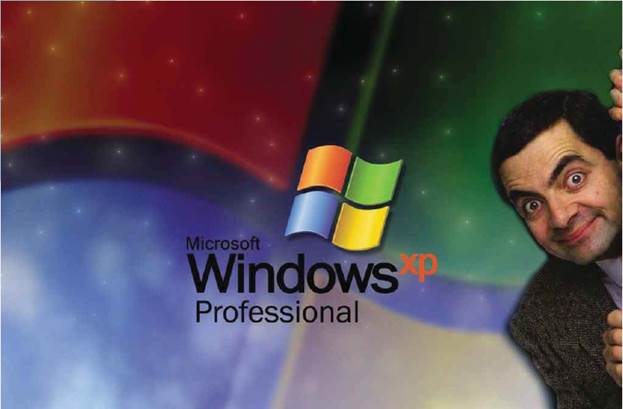
Can Microsoft Really Kill Off Windows
XP?
Immortal XP
First released to the
public in the run up to Christmas 2001, Windows XP wasn’t an overnight success.
Businesses had heavily invested in Windows 200, and for most home users Windows
98se was a stable and reliable platform.
What the average user
didn’t appreciate was that XP drew together both Windows 2000 and, by ancestry,
Windows NT with the hierarchy that began with Windows 3.x. it was business and
pleasure fused, with a desirable mix of the best parts form each side of those
respective coins.
Users liked having the
same interface at home and work, and the stability of the XP experience was
amazing when compared with the complete misfire of Windows Me
When you look at the
specification for XP, it’s incredibly modest by current standards. The Home
version would run in 64MB of RAM and on a 233MHz x86 processor. An installation
took 1.5GN of hard drive space, though subsequent service packs did expand this
to about 4.2GB in total.
“Windows XP, I come not to praise you,
but to watch with incredulity as Microsoft tries to bury you alive”
Microsoft normally
gives its products a ten-year lifespan, which means XP should have been
declared deceased in 2011, and if it wasn’t for corporate pressure applied to
the company, that’s exactly what would have happened.
However, the drop-dead
date for XP support has been extended a number of times, even I Microsoft made
little disguise of its strong desire to see the end of it.
It’s now given it one
last date of downfall, and on 8th April 2014, all support for XP
will be completely withdrawn. What are the implications of this, and how might
it affect anyone running Windows XP?
XP Disavowed
Just over one year
from now, Microsoft intends to lower XP into a vat of ravenous malware writers
and wave it a less than fond farewell. There will be no patches, no security
amendments and almost certainly no support.
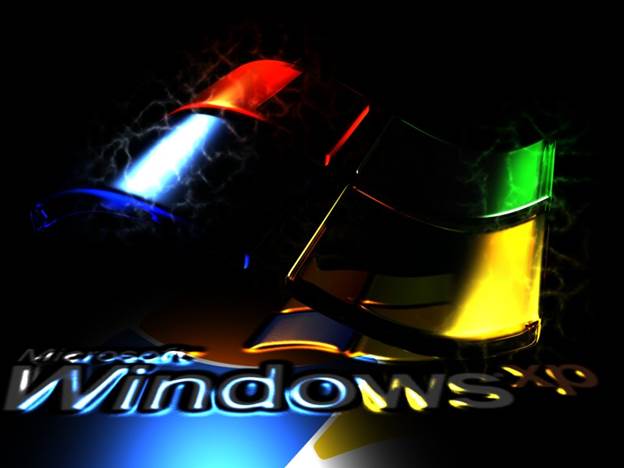
Microsoft intends to lower XP into a vat
of ravenous malware writers and wave it a less than fond farewell
For corporate
customers that pay $200,000 for the privilege, there will still be some
support, but for the vast majority of XP users, the holes and crevices in the
security of your OS will remain open and available for ever more.
What’s slightly
disconcerting for Microsoft is that many of its big business customers haven’t
started the transition to Windows 7 (because Windows 8 isn’t for business,
they’re told), and for a decent-sized operation, a timescale of at least 18
months would be a very minimum. When you consider that the last migration most
blue-chip companies executed was from Windows 2000 to XP, it could easily be
ten years since they last did this, and it’s entirely possible that most young
IT staff will never have experienced anything so traumatic.
The reluctance to
exorcise XP from their systems is based not only on the experience of what
works, but also the pitfalls of using newer solutions. The majority of IT
managers will cross their fingers and hope that their business changes
direction, removing the necessity to migrate their XP systems, before it
becomes a real issue.
Corporate IT is very
much influenced by ‘the devil you know’, and XP falls perfectly into that category.
Rise & Fall
As Windows OS sales
go, XP started rather slowly according to Microsoft, presumably inheriting some
negativity form both Windows Me and the concept of activation.
In researching this
article, I found a very ancient posting by Joe Wilcox on CNET from December
2001, which details these early retail road bumps. It talks about 400,000 sales
in October, followed by just 250,000 in November 2001. That compared quite
badly with the 580,000 that Windows 98 sold in its first month, and the 19
million licenses that it shipped of Windows 95 in the first year.
Amusingly, quoting
Howard Dyckovsky, an NPD Intellect analyst, he suggested that the heyday of big
Windows retail sales was over, “It’s a sign of the change in the market that
operating systems relatively aren’t as important in the retail market,”
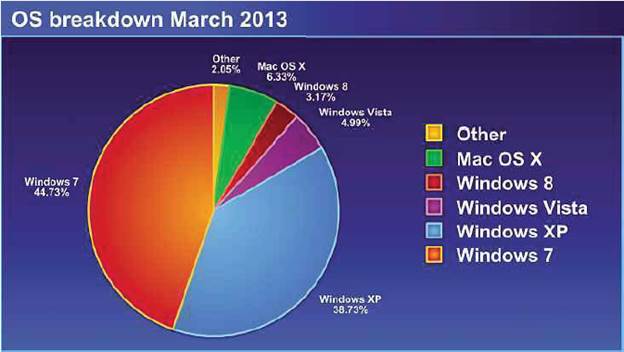
OS breakdown March 2013: There are only
two major players, and they are Windows 7 (44.73%) and Windows XP (38.73%).
Irrespective of the
doom that Howard Dyckovsky was dispensing, XP went on to secure over 600
million sales in the nine years and two months it was available. That makes it
Microsoft’s most successful product if you consider the domination of the
operating system market, where it once had more than 95% of the market.
What’s interesting
about these numbers is that they are estimated, because Microsoft has been
remarkably tight lipped about XP sales from the outset. A number of 400 million
units (eight million a month) have been bandied about for the first 50 months,
but that came from a single IDC analyst.
The analyst Gartner
has estimated that between 2002 and 2005 some 1.1 billion PCs were sold in the world,
of which 55% ran XP initially. What’s difficult to quantify is that some
computers ended up with more than one license (if they moved from Home to Pro),
and computers die, even new ones on occasion.
What also skews these
numbers is that the number of computers has steadily grown until recently, so
comparing previous releases with newer products isn’t always a valid test. XP
is installed on more computers today than existed in eh world when it first
launched.
In 2002, for example,
132 million PC systems were sold, whereas in 2012 about 90 million were sold
each quarter, giving an overall volume of 352.4m for the whole year. That’s
11.5 million less than 2011, for those who are curious.
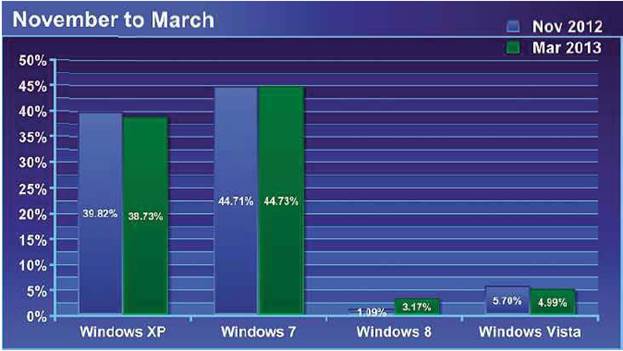
If we take the last November 2012
numbers and compare them with the March 2013 ones, the picture becomes clearer.
Before anyone writes in, these numbers don’t’ add up to 100% because I’ve
removed other operating systems from the numbers for clarity.
It’s also worth noting
that it took until august 2012 for XP to be eclipsed as the most popular
desktop OS in the world, when Windows 7 finally got percentage parity. I’ve
seen some wonderful discussion pieces that talk about how XP failed to compete
with Windows 7, rather forgetting that Microsoft stopped selling XP in October
2010. Therefore, its numbers remained entirely static, and any computers that
had a license and then failed were effectively removed from the numbers. Given
those limitations, XP held up very well, even if Windows 7 did manage to sell
250 million copies in a single year to gain substantial ground.
Where do we stand now?
I’ve created a graph showing figures that were published by NetMarketShare for
March of 2013. They show that Windows 8 has yet to get 50% of what small part
Apple commands or even overtake poor Vista. There are only two major players,
and they are Windows 7 (44.73%) and Windows XP (38.73%).
However, what this
doesn’t show is any trends, as it represents only a snapshot in tine. If we
take the last November 2012 numbers and compare them with the March 2013 ones,
the picture becomes clearer. Before anyone writes in, these numbers don’t’ add
up to 100% because I’ve removed other operating systems from the numbers for
clarity.
In the past four
months since Windows 8 launched, XP has only lost 0.09% of the overall market
share, and Vista lost 0.71%. If this was a linear decline, a good number of
people would still be using XP in 100 years, even if the market size multiplied
in size by fivefold.
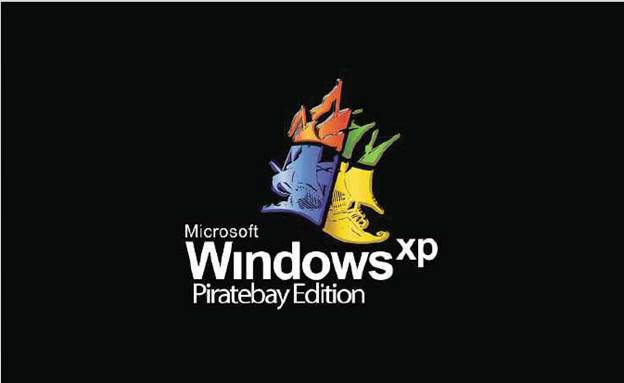
If Microsoft walks away from XP, it
can’t really complain if others support those who wish to use it, can it?
I entirely accept that
in the world of computing very little is linear, and XP will probably show a
marked and dramatic decline in a few years, though when this will come and how
big it will be isn’t revealed by current statistics.
What I also can’t take
into account is those people who will refuse to leave XP whatever Microsoft
launches, as this core of XP fans undoubtedly exist.
Buried in the data I
found for these charts but which I’ve also left out is the classification
‘Windows old’, at 0.13%, which are those people still using Windows 95, 98, Me,
Windows 2000, and even, god forbid, Windows 3.x
That might not seem
like much, but with an approximate installation base of 1.5 billion computers,
three are about two million people using operating systems from the past
century. With methods of collecting this data being based on the internet, I
suspect that the actual number of ‘Windows old’ is much higher, as many might
be located in geographic location where an internet connection is not commonly
available.
What’s undeniable is
that Microsoft is killing XP when it’s still dominating the user space,
something that form the public perspective seems utterly bonkers.